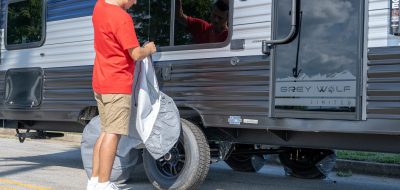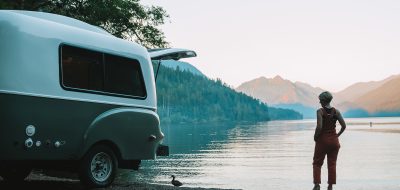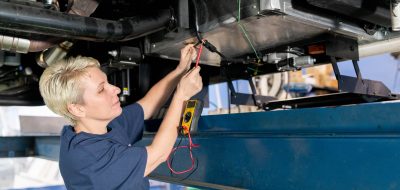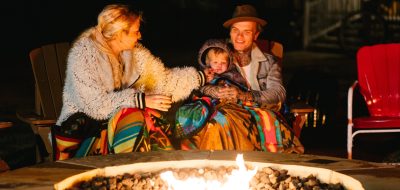By Bob Difley
 When it comes to financing our passions, we RVers are among some of the luckiest people on earth. Compare our RV lifestyle with the way most of the rest of the country lives. When you live in a house, you can pretty much predict what your monthly expenses will be. Mortgage, car payments, club dues, gasoline for the commute, food, etc. They don’t change much. But when times get tough–like now and for the past couple years–how do you pare expenses to compensate for a drop in wages, maybe a loss of a job, and falling stock prices slicing away at investments?
When it comes to financing our passions, we RVers are among some of the luckiest people on earth. Compare our RV lifestyle with the way most of the rest of the country lives. When you live in a house, you can pretty much predict what your monthly expenses will be. Mortgage, car payments, club dues, gasoline for the commute, food, etc. They don’t change much. But when times get tough–like now and for the past couple years–how do you pare expenses to compensate for a drop in wages, maybe a loss of a job, and falling stock prices slicing away at investments?
Now consider the advantages of the RVer. About the only static major expense is the payment on your rig, which if you were lucky enough to start fulltiming, you sold your big house and bought your dream rig for cash. Now when times get tough, you can easily–and instantly–make adjustments to your “out go” to keep finances in check until the inevitable turn around.
For instance, look at the following ways to trim your RV Lifestyle expenses. You may find that some are much easier to do than others, and may actually free up some “play” money even when there is no financial crunch to deal with–and maybe even be more enjoyable.
- Move from pricey full service RV resorts to “back to nature” primitive forest service or BLM campsites for several days a month. Two nights at a forest service campground at $10/night could save $30/night or $240/month.
- Try boondocking–rent free–a few days a month to save campground fees. Two days of boondocking a week could save as much as $40/night, or $320/month. Boondock even more and you could save a bundle–and maybe even like the open space more than crowded resorts.
- Reduce your fuel bills by staying longer where you are. Explore the area more fully by walking, riding bikes, or driving your mileage-friendly toad–before moving on.
- Get better mileage when you do move on by driving at 55 mph instead of 70 and traveling shorter distances. You’ll see more and arrive at your next campsite more relaxed.
- Cook in rather than eating out. You can prepare more healthy dishes, just the way you like them, and save money over expensive restaurants.
- Find out where and when the local farmers markets are and shop for the freshest, healthiest, and best tasting food you can buy–and at direct-from-farmer-to-you prices.
- When you do eat out, look for small ethnic restaurants and mom & pop eateries on side streets, instead of those in the high rent–and high price–district like those in tourist areas and along major highways.
- Choose campgrounds and national and state parks away from urban areas with natural–and free–attractions like hiking trails, scenic drives, and fishing lakes.
No other style of living can offer so many choices, whether you need to hunker down for a bit, or you feel flush and decide to stay at the best RV golf resort and drink champagne every afternoon at cocktail hour. With RVing, the choice is yours.
These and many more ideas for saving money can be found in my newest eBook, 111Ways to Get the Biggest Bang for Your RV Lifestyle Buck.





Pingback: how to make a website
Pingback: payday loans
Fedora
As someone who worked all her life, but spent 18 years as a single parent with no retirement after a 2nd divorce, I ended up full-timing in a TT. I had planned this for about 10 years and I still have my own business which I work at part-time from the RV. I went for an older RV — better made and comfy. Over 2 years I’ve replaced the major appliances (hot water heater, AC, refrigerator) and am doing a few other things. If I were in a house or rental, I’d be doing many of those things anyway and in the end, this is MY home and I can have it as I like it.
This has allowed me to live within a minuscule budget without feeling pinched. No, it’s not a huge, gorgeous new bus sailing down the road. But I can afford it and it’s mine. I always planned to spend at least a couple of months in each location — to have time to explore, so I pay rent monthly. I want to get solar panels installed — that’s the next big expense. My tow vehicle and trailer are paid for.
All in all, I am enjoying life in a much smaller, easier-to-maintain footprint. If you need a fancy lifestyle, then you have to pay for it. I’ve had both and I don’t need that now. There are many older RVs out there — you just have to look for them and know what you are getting. If you maintain them and they look decent on the outside as well, most places welcome the older ones just as much as the new ones.
Bill Chaffee
You didn’t mention volunteering. We live many months out of the year in some very nice locations with full hookups by volunteering at state parks. There are also additional perks in some states. Vt. even filled my propane tank. There are many other volunteer positions available on shorter terms such as NOMADS, & Habitat for Humanity. You also meet and work with some very good people. We’ve enjoyed this lifestyle very much, and still get to travel around the country.
Susan
Great article Bob!
We used a lot of your tips during our three month road trip this winter when we covered 14 states and 10,801 miles. We were able to winterize our home in Northern Michigan (which saved us a bundle in heating costs), boondocked often, and took advantage of America the Beautiful pass discounts whenever possible.
I was shocked to find some National Forest campgrounds with amenities that were free while others wound up costing us $3.00 a night. Being self-contained and having a solar panel allowed us the freedom to utilize these places for longer periods of time.
Joe
This story completely and absolutely glazes over the fact of the initial investment in the RV, (other than praising the sale of an appreciating asset – the home, for a perpetually depreciating liability – the RV, including the toad).
As RV’er we all take on a false sense of superiority to “all the other’s in the country”. But the simple fact is that most of those “others” will never be able to afford the purchase of an RV, ANY RV, much less being able to afford the purchase of their own home to be able to someday sell to in order to purchase their “dream rig”, in a financially devastatingly irresponsible manner.
It’s one thing to decide to go fulltiming, yet have a very nice and beautiful home to return to every once in a while! It’s a completely other very sad thing to sell your stick home and then try to justify your needing to save money by cutting corners as mentioned in this article. If you cannot fully afford to be on the road and enjoy yourself, then go back home and truly save your retirement dollars!
Vickie
Shhh…let’s not share this secret with everybody:-) We’re like a couple of you and waiting for our house to sell so that we can RV fulltime. Thanks for the wonderful reminders of why we are, and can, go fulltiming on our social security benefits. No, we’re not wealthy in dollars but extremely wealthy in a sense of adventure and starting a new lifestyle. P.S. We’re leaving the Jones behind with their high utility bills and maintenance.
Ken Locarnini
I’m with Carl in that I’m a younger fulltimer. I’ve hardly ever lived in a conventional house, since discovering the Escapees and RV’ing some many years ago. Renting housing is so expensive and ridiculous, not to mention so much wasted superfluous space, when one can purchase an RV instead with the added benefit it is their home. As alluded to, the freedom to come and go, and change the surroundings at a moments notice, is a freedom not to be underestimated.
I always tell younger people to skip home ownership or renting, and buy an RV instead. Look at seniors who own a house their whole life, then sell it all to live their remaining years enjoying themselves. I say SKIP the middle part, and retire NOW!
Pat
Tres bien! Once again Bob you have written a great article. We hope to be part-time ‘full-timers’ in about a year. I’ll be getting your e-book!
Curtis McRee
Most of us has a choice in how we live and where we live. There isn;t any
life style better than living and traveling in an R.V. Life is what we make it to be.
There is so much to do and so much to see in these United States.
Live slowly,enjoy each day and leave every place cleaner than you found it!
Great article Bob.
Carl C
After reading this story, I get the *impression* that most full-time RV’ers are somewhat independently wealthy or are ready to retire. Well, I’m a working class full-timer. I spent most of 2009 unemployed and purchased a used Georgie Boy Pursuit in Dec ’09 for economic reasons. How I got the loan, I’ll never know! 😛
Here’s a perspective the story missed: forget home-ownership! What about renters? When a contract becomes available, I’d have to find accommodations, pony up as much $1800 for a rental, move all my belongings to the new area at some considerable cost (~$1500 to ~2000), unpack, work for a 6-month-to-hire gig which inevitably ends ~9 to 12 months later where the whole process begins again. (Sorry for the run-on sentence.) Monthly rent? On average: $800.00 per month (with an analysis covering 12 years).
So, to break from “The Man” I purchased my RV as a salvation rather than any desire to travel. (Military brat and I’ve never lived *anywhere* more than 5 years; and, that 5 years was 20 years ago – it’s still a record.)
So, after some initial high costs ($3200.00 NY Tax, NY plates) and after working again for a few months I’m beginning to see some positive returns on my investment.
What’s really funny is that I enjoy the RV advantage more than anything else. If my job ends I can up and leave at a moments notice. With rental properties, I end up having to fork over (at my last, and hopefully final, rental) $1600 to break the leasing contract. I have more than a few colorful metaphors for rental property owners.
So far I enjoy the RV lifestyle.
Tige
We still have a house, Bob, but hope to save a few bucks on our heating bill next winter while in AZ and CA thanks to a couple of e-books of yours.
MrDxerCa
Nothing to do with RV’ing (and then, who knows?) but it does feel good to vent out a bit. The difference between government and private industry: the latter knows when to stop hiking prices up because they KNOW it will run them out of business as the former thinks it can milk the cow till it is bone dry while day-dreaming doing us peasants a favor! To “serf” with love!
Barry Zander
Hey, Woodward, South Dakota saved us a bundle on truck & trailer registration and insurance. And, Bob, you’re right on. For us, we travel full-time without worrying about “keeping up with the Joneses.” Matteroffact, I think the Joneses passed us up on I-10 yesterday. As for Boondocking, this is a good time to say thanks to Walmart for hosting us when we’re ready to stop for the night at 9 p.m. We would like to support the private RV campgrounds more, but it’s hard to justify $25-40 a night for a 10-hour lay-over when we won’t use the campground’s services. I don’t understand why the privates don’t have a late-in-early-out reduced rate to compete with Walmart.
woodward
i bought a new Montana last year. the plate taxes was $140. the unit is a fifth wheel, no engine, so i thought it was a little high but we decided we could manage it. SURPISE this year when we went to plate it and the bill was $800. i checked every state i can think of and can’t find a break anywhere. i’m beginning to think this was a federal excise tax placed on these plates. wonder who could be responsible for this????? feds are beginning to price gouging worse than the fuel people.
Sue Tsuda
I don’t fish, but I like to sit outside and read. Don’t forget your local library – wherever “local” may be. If you can’t take out books because you are not a resident, maybe they have used books for sale. Our library sells paperbacks for 25 cents and hardbacks for $1. Thrift stores and yard sales are also a good place for used books as well as gently used clothing, household goods and folding chairs as well as amusement and amazement at some of the stuff that someone else bought and gave away. Free entertainment!
Judy
Thanks Bob, once again your article has reminded me why I am so looking forward to the lifestyle. I am just waiting for my home to sell then I will be out there with the rest of you lucky dogs doing what we all enjoy, having the freedom of the road. Keep them coming.